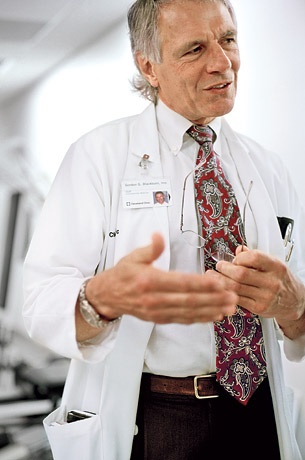
Gordon Blackburn, the program director of cardiac rehabilitation.
(3 of 4)
Nearly all of the 5.5 million patients who have passed through the clinic's doors since it opened in 1921 now have a digital health record, and this electronic paper trail is an ideal partner to prevention. The hospital's patient-record system, MyChart, is synched with Google Health and Microsoft's HealthVault to give patients the ability to upload important health information directly from devices such as scales, home blood-pressure monitors and glucometers, which measure blood sugar. That allows patients to track their progress and also helps doctors see whether treatments are working. Doctors and patients can also communicate better digitally, without the need for appointments.
Lifestyle Turnaround
All this, of course, makes good sense, and studies have already documented the positive impact preventive measures can have on health. What is less established is the financial case — that prevention saves a company money. That's the question that keeps accountants and insurers from investing in these programs, and that's why Roizen is working to answer it.
A compact, intensely energetic man, Roizen has assumed the responsibility of evangelizing beyond the clinic's doors. His message is directed less at consumers than at the health-care industry. "The only way to justify doing wellness in a commercially viable way," he says, "is to demonstrate that you can lower the cost of care."
Roizen is attempting to do that with Lifestyle 180, designed for patients with chronic conditions that generate the bulk of our health-care costs. The program is run out of a facility that seems less a medical institution than a New Age retreat: a bucolic campus in nearby Lyndhurst that was once the corporate headquarters of manufacturing giant TRW. Patients who enroll in Lifestyle 180 get broken in gently. For four hours, twice a week, over six weeks, they are coached through cooking classes in which a chef passes along such tips as healthier panfrying (use thinner pieces of fish or chicken and finer bread crumbs to reduce the amount of oil that gets absorbed), a dietitian teaches smart label-reading, and yoga and stress-management coaches teach meditation and how to build muscle tone.
Throughout the process, members of Roizen's team, led by Dr. Elizabeth Ricanati, take measurements, run blood tests and monitor what is happening in the patients' bodies. The hope is that participants can eventually reduce or eliminate their dependence on insulin or blood-pressure medications or pain pills and actually stop illness in its tracks. Since the program began in October, its 114 patients have, on average, reduced their LDL cholesterol by 10 points and shaved more than 3 in. off their waistline.
What's more, the coaching doesn't stop when the Lifestyle 180 sessions end. The patients come in for five follow-up sessions over the next year, and Ricanati keeps in touch with weekly e-mails of tips to keep them committed to their newfound health habits. So far, a quarter of the patients have either avoided getting on medication, reduced their dose or stopped needing drugs altogether.
Whether Lifestyle 180 can actually reduce health-care costs in the long run remains to be seen. Clinic employees can join the program for free, but anyone else who wants to enroll must pay $1,500. Some local companies have started to pick up the tab, hoping to reap the financial return that Roizen promises.
The Cleveland Clinic's own experience suggests that Roizen's confidence in prevention's payoff is well founded. The hospital's chief human-resources officer anticipates that after growing between 4% and 8% each year over the past six years, employee premiums will not increase in 2010. That's in part due to savings from employees with chronic illnesses who are making lifestyle changes to keep themselves from getting sicker. This saves the clinic between $5,000 and $10,000 a year per patient on claims they would have otherwise filed for treatments such as dialysis, angioplasty or bypass.